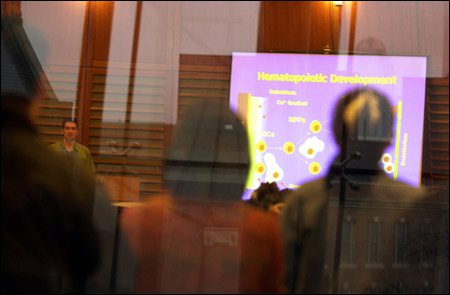Ethical divide affects stem cell funding
Funding shrinks, debate grows
HARVARD STEM CELL INSTITUTE

On Aug. 9, 2001, President George W. Bush changed the landscape around embryonic stem cell research.
In a speech that day, Bush, while permitting some work on existing stem cell lines to go forward, banned federal funding for research conducted on embryonic stem cell lines created after that date.
At that time, it was estimated that approximately 60 stem cell lines derived
Stem cell videos:
- Dr. Melton researches stem cells
- Dr. Scadden prescribes stem cell therapy
- HSCI hopes to accelerate research
- Dr. Scadden on embryonic stem cells
[default format for video is RealPlayer. For videos in Quicktime format, visit http://www.harvard.edu/multimedia/]
– More stories about stem cells
– Harvard Alumni Association videoconference on stem cells, “Unlocking the promise of stem cells”
– Harvard Stem Cell Institute hosts inaugural symposia (press release 4/23/04)
before Aug. 9, 2001 were available worldwide. Scientists have since discovered that, due to intellectual property concerns, logistics involving lines located abroad, and problems with viability, only 18 lines are currently available and useful.
Since this decision, the role of supporting research in this area is increasingly being filled by private organizations, such as the Harvard Stem Cell Institute.
The institute, which organizers believe will become the largest and most comprehensive such effort built around stem cell research, follows on stem cell-related centers and initiatives at Stanford University, Rutgers University, Johns Hopkins University, and the University of California, San Francisco.
The president’s decision came amid a fierce debate over embryonic stem cell research. The debate is fueled by both the research’s promise to treat diseases relating to organ and tissue failure, such as diabetes, Parkinson’s disease, and Alzheimer’s disease, and by the necessity to extract stem cells from human embryos – tiny masses of cells called blastocysts – to conduct the research.
Currently, the embryos are created during the in vitro fertilization process by infertile couples seeking to have a baby. Clinics providing in vitro fertilization services take eggs and sperm from the couple, fertilize the egg in the lab, and then implant the fertilized egg in the woman. Extra fertilized eggs that result from the process are frozen and stored.
Each year, thousands of stored fertilized eggs are routinely discarded by these clinics. Some, however, are donated to stem cell research. The eggs are allowed to divide for several days and then the stem cells are extracted from a tiny mass of cells the size of a pencil tip (the blastocyst), which is destroyed in the process.
Opponents of the research argue that it is immoral to destroy potential human life for the sake of research. Supporters of stem cell research, on the other hand, argue that it is immoral to routinely destroy these frozen eggs when they can be used to cure diseases that afflict millions.
On an even more contentious issue, the U.S. House of Representatives has passed legislation to outlaw all human cloning, including both reproductive cloning – on which there is broad agreement that a ban is appropriate – and therapeutic cloning, which is expected to be a major focus of future stem cell research. The cloning ban has not been accepted by the Senate, however.
Other donors, including individuals, disease advocacy groups, private foundations, and some state governments, have stepped into the financial void left by the federal government’s withdrawal.
In California, momentum is building for a ballot initiative that would mandate $3 billion for stem cell research. In New Jersey, Gov. James E. McGreevey has announced plans for a New Jersey Institute for Stem Cell Research, centered at Rutgers, which would get $6.5 million in initial state funding.
“We have an obligation to every patient afflicted with Parkinson’s, to every family that has watched a loved one suffer from ALS or Alzheimer’s, to seize the opportunity before us,” McGreevey said in his February budget address.




